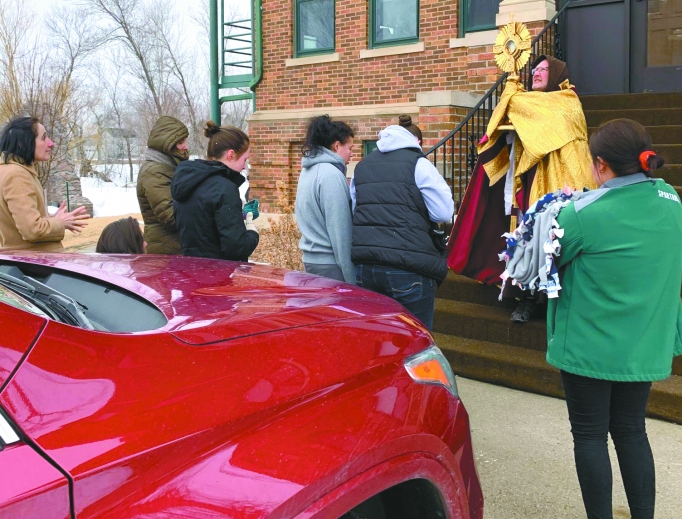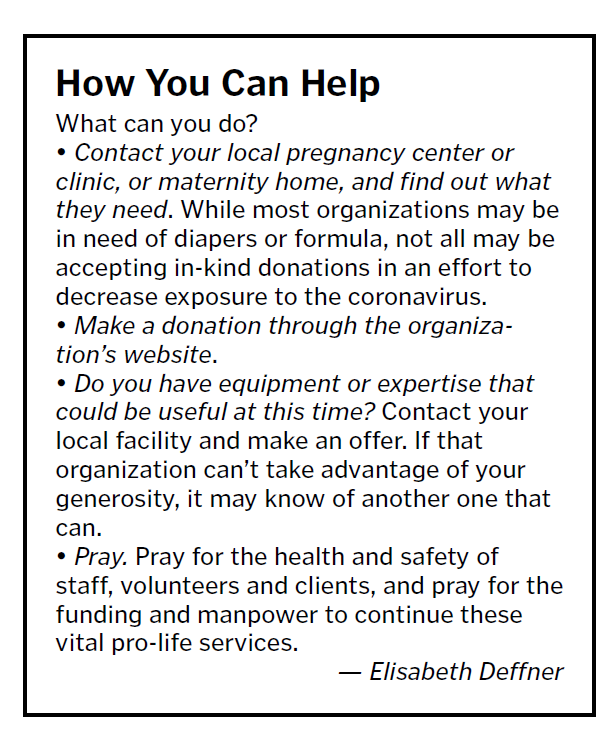Maternal Devotion: Sheltering, Assisting Moms and Babies During Pandemic
The coronavirus crisis is a new challenge for pro-life organizations.

“We have no child care now — we’ve had to let the child-care people go home. All the moms with part-time jobs, [the jobs] have shut down. Every day we had volunteers for baby cuddlers and help in the child care — they’re not coming in. Two events we had planned, they’re gone. That money is probably 50% of what we need for our budget, and now that’s gone,” says Mary Zeien, executive director and foundress of Chicago maternity home The Well of Mercy.
“I live here with the women, and I said, ‘We’re going to be okay. We’ve all had tremendous trauma; we’ve all come from extreme challenges. This is another challenge: We can do this.’”
That can-do attitude is common to maternity homes, pregnancy-resource centers and pregnancy clinics across the United States, although the coronavirus pandemic is a challenge somewhat different than any of these pro-life organizations has faced before.
But one overriding concern keeps them moving forward.
“Abortion clinics are open, so I’ve got to be open,” says Lori Berg, executive director of Foothills Pregnancy Resource Center in Southern California.
Debbie Bradel, R.N., works for two pro-life pregnancy centers, both of which have modified the way they serve clients in the interest of reducing exposure to and spread of the coronavirus.
At Turning Point in San Diego, Bradel explained, “If a woman is considering abortion, we’ll see her no matter what, [but] if it’s a woman who can’t get in to her OB yet, and wants to see an ultrasound just a little bit ahead, we will say, ‘Let’s wait and just see what’s going on with the virus, just to decrease exposure risk.’”
At Birthline, another San Diego center, staff now meet with clients in the outdoor courtyard, rather than bringing them into the office, and they’re not doing their typical case management. Birthline typically offers supplies to women in need, ranging from diapers to nonperishable food, and is continuing to do so.
But in March clients were told to come in for a two-month diaper supply, plan to stay away during the month of April, and expect to return for more supplies, as well as face-to-face counseling, this month. “That might change,” Bradel said.
Many pregnancy centers and clinics have shifted to a temporary no-walk-ins policy to protect clients and staff. Boston Center for Pregnancy Choices is among them.
“We can take phone calls via hotlines, and people can use our website to set an appointment with us, as well,” said executive director Tony Searles, who started in this position in early March.
“We don’t feel entirely hindered, but it’s not the normal way we’ve done things.”
The Boston center has also relieved its volunteers of duty, which puts an extra burden on staff who have to take over jobs volunteers would normally handle — including manning the baby boutique, which is open once monthly for clients to pick up diapers, formula, wipes, clothing and other necessities.
The center is striving to protect clients, too: Rather than opening the boutique in March, staff contacted clients, asked what they needed, and bagged those items so clients could pick up their supplies to-go.
“We could definitely use prayer; we could definitely use wisdom; we could definitely use in-kind donations,” said Searles. “Things run off the shelves so quickly.”
At Well of Mercy, residents are naturally focused on stewarding supplies wisely — but that’s not their only concern.
“I have online school now; my daughter, who’s in preschool, has online school, too,” explained Ka’Leila, 24, with a laugh.
A resident of Well of Mercy, she describes sheltering in place as “a blessing and a curse.” She is with her 4-year-old daughter virtually all day — which is wonderful, though exhausting. “All day long, it’s ‘Mom! Mom! Mom! Mom! Mom!’” she said.
Along with the other moms, Ka’Leila takes turns babysitting, entertaining and distracting the 13 children who live at Well of Mercy. And like the other moms, she has learned that when a resident is off baby-sitting duty, it’s best to let her have a little time to herself.
“Everybody’s home; pretty much all of our jobs were canceled. We’re learning not to bother people when they shut their door,” she said.
But still, she added, “I really wouldn’t want to be anyplace else.”
The coronavirus pandemic may be new, but pro-life organizations are no strangers to big challenges.
“When 9/11 happened, that was a trying time [for our organization], as well,” said Madge Osborn, executive director of Pacific Pregnancy Clinic in Coos Bay, Oregon. “But you know what? God has never failed us. We’re just going to trust him.”
The center is also taking steps to steward supplies that it distributes to women and families in need. For instance, the center has typically given out cases of formula, but has reduced that to two cans at a time, to prevent people from selling the surplus online. “We can space it out and watch, making sure the babies are getting it, that people aren’t getting it for monetary gain,” explained Osborn.
But in most other ways, it’s business as usual. The center is still open to the public and still offering pregnancy tests.
And miracles are still happening.
“We’ve had clients that are struggling with what to do with their pregnancy now: ‘He was working, but now he’s not; how are we going to support a baby?’” Osborn said. “We had one that just said, ‘Forget it: I’m going to have the baby. This was the plan. We’re not going to abort the mission.’”
Like Pacific Pregnancy Clinic, Angel House Maternity Home has not yet felt an intense impact from the pandemic. Kandice Hunter, a case worker at the Charlotte, North Carolina, facility said that although she personally has faced some grocery-shopping challenges, Angel House is well stocked.
“Right before all this started going on, we got a really big donation from one of our local churches,” she explained. “And we went shopping early on. We haven’t felt any effects. Our biggest struggle would be to make sure everyone is washing hands from being outside — that’s really the only thing.”
Meanwhile in North Dakota, St. Gianna’s Maternity Home in Minto has been on lockdown since March 18. The facility has typically housed no more than six mothers, but now is housing 13 people, including the mothers and teenagers who are currently residing there, two children, staff, a priest and Gianna Emanuela Molla — the youngest daughter of St. Gianna, who has been in the United States since March 3 and was in quarantine before traveling to her mother’s namesake facility. Lockdown happened immediately after her arrival.

“We took the Blessed Sacrament around our grounds and locked our doors,” said director Mary Pat Jahner. “We feel very blessed we are among very few people in this country who will be able to continue Mass.” While St. Gianna’s has always prayed Compline for its supporters, it has now instituted an 11am Mass and a 4pm Holy Hour every day to pray for them. “We exist because people are generous to us. Now it’s our time to be generous in return,” said Jahner. “We tried to stock up on our groceries, and if we get desperate, people will drop off in the entryway. We’re not looking at it in terms of what we need, but of what we need to do. It’s a real desperate time, but from the beginning here, we’ve always trusted God.”
Elisabeth Deffner writes from Orange, California.
- Keywords:
- elisabeth deffner
- moms and babies
- prolife















